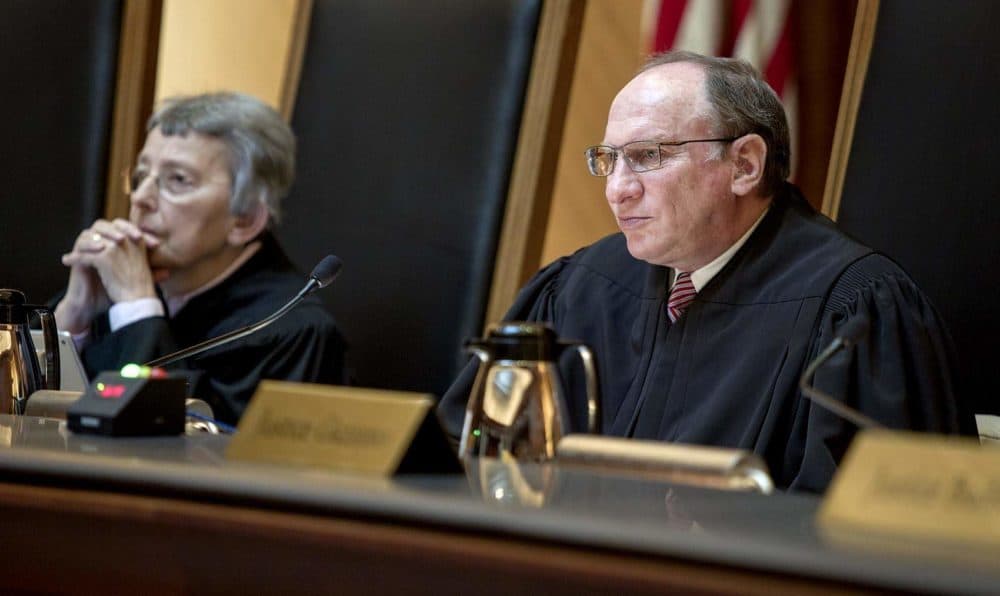Advertisement
Mass. Courts Plan To Soften Courthouse Cellphone Bans

The state Trial Court on Wednesday detailed steps it would take to begin rolling back bans on cellphones, if appropriate, in dozens of Massachusetts courthouses, citing a report that detailed how full bans create "unacceptable hardships" on users of the justice system.
The report by the Massachusetts Access to Justice Commission found that while phone bans are often intended to protect against the threatening or intimidation of witnesses, victims or jurors, they can have unintended consequences.
The report cited hardships such as the inability of self-represented litigants to present photos or text messages as evidence to a judge, to consult their calendars, to reach child care providers, or to transact other "essential" business.
The recommendations of the working group include a full review of all courthouse bans to determine whether they are justified, and a pilot program to test the use of magnetically locked security pouches.
"Instead of using a strategy that relies on prohibiting the possession of cell phones as a condition of entry, each courthouse should employ a strategy, tailored to its security needs, that relies on regulating and controlling the use of cell phones within the building," the authors of the report wrote.
The Massachusetts Access to Justice Commission is co-chaired by Supreme Judicial Court Chief Justice Ralph Gants and attorney Susan Finnegan, of Mintz, Levin, Cohn, Ferris, Glovsky & Popeo, P.C.
The commission in August 2018 decided to form a working group to review the Trial Court's policies on personal electronic devices. The group included retired Appeals Court Justice Cynthia Cohen, retired Superior Court Justice Paul Chernoff and former Massachusetts Bar Association President Jeffrey Catalano.
The group identified 56 courts, some housed in the same courthouse, where cellphone possession is banned.
While bans in those courthouses are considered important for the safety of people using the court system, the report found that the policies also erect barriers to access.
Some courthouses, the report found, lack on-site storage, which forces court users who do not have a car to hide their phones outside in the bushes or under flower pots. Others must pay a nearby business to store their phone for a fee.
"The goal must be that no persons are denied entry to our public courthouses because they are carrying cell phones; nor should they be compelled to leave them at home, pay for them to be stored, or hide them outside, as a condition of coming into the building," the report's authors wrote.
Some courts, such as the Dorchester Division of the Boston Municipal Court, have already taken steps to find a middle ground, including the creation of a protocol for self-represented litigants to get permission to use their phones to present evidence to a judge. These cases often involve restraining orders.
As a result of the report, the Trial Court said it would take three immediate steps, starting with a full review of all courthouse cellphone bans "with the intent to rescind any bans where it is appropriate to do so."
The court also said it would update its policies to help allow the use of cellphones by self-represented litigants, and evaluate the use of pouches made by a company called Yondr for use in courthouses where bans are still deemed necessary.
The pouches would allow a courthouse visitor to retain possession of their electronic device without the risk of unauthorized use.
"These recommendations are very helpful to the Trial Court as we examine the use of cell phones in courthouses across the Commonwealth," Trial Court Chief Justice Paula Carey said in a statement. "We are mindful that this effort must be integrated to balance safety and security concerns with the need for increased access to cell phones in courthouses wherever possible."
Members of the working group analyzed more than 90 policies from other states and jurisdictions, and made trips to Philadelphia, Washington, D.C., and Prince George's County, Maryland, to observe the use of Yondr pouches. According to the report, a number of Boston public schools already use Yondr pouches, and since July 2018, the Massachusetts Board of Bar Examiners has used Yondr pouches to prevent cheating.
The report acknowledged that there would need to be a transition period, but said all bans should be eliminated "as soon as practicable."
While bans continue to exist, the working group recommended that the courts develop a systemwide exemption for self-represented litigants and improve websites to keep the public informed of the details of each ban and availability of storage.